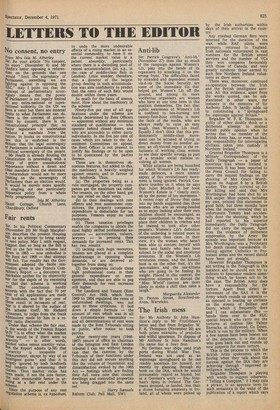Pair rents
Sir. In his Political Commentary (November 20) Mr Hugh Macpher,aon describes the present Housing id ill as an attempt to bring sanity to rent policy. May I, with respect, Suggest that so long as the Bill is tied to the fair rents scheme laid drown in 1965 — now embodied in the Rent Act 1968 — that attempt Will fail. Too readily has the Government adopted the facile conclusion given in the Francis Corninittee's Report — a document remarkable neither for its objectivity nor for the depth of its reasoning that that scheme is working well. The conclusion hardly accords with the fact that 70 per cent of all applications are made °Y landlords, and 90 per cent of these result in increases of rent. Nor is it shared by the author of e scheme itself, Mr Richard Lirossman, to judge from the frank admissions made by him in a recant radio discussion.
, Under that scheme the fair rent,
the words of the Francis Report (/.5) "is in effect what the market Value would be if there were no Scarcity" — in other words, Market value minus scarcity value. But the Report admits (p.58) that scarcity is incapable of Measurement, except by way of an Mtelligent guess" and that it is 'argely ignored by both landlords and tenants in presenting their ,!ialms. Thus market value has een made, if not the sole factor, „`ll sole measurable factor in ar:iv,ing at •a fair rent under the 'cneme, Since the purpose of any rent regulation scheme is, ex hypothesi,
to undo the more undesirable effects of a rising market in an essential commodity, to base it on the current market value is a patent absurdity, particularly where there is a dwindling pool of rented accommodation (as, e.g., in the case of middle-class flats in London). Little wonder, therefore, that a director of the largest group dealing in such accommodation was able confidently to predict that the rents of such flats would double within three years.
So much for the basis of assessr ment. How about the machinery of the scheme?
Ninety-five per cent of all applications under the scheme are finally determined by Rent Officers — appointed without any minimum standard of qualification — who operate behind closed doors, and who are accessible to either party individually. In the five per cent of cases which are taken to the Assessment Committees on appeal, the Rent Officer is not present to justify his findings or to be open to be questioned by the parties thereon.
These are in themselves obnoxious features, but added to this, the machinery is heavily weighed against tenants, and in favour of the landlords. Thus; (a) The properties being as a rule mortgaged, the property companies get the maximum tax relief. The tenants, on the other hand, get no tax relief on their rents.
(b) In their dealings with rent officers and rent assessment committees, the property companies' expenditure is deductable for tax purposes. Tenants enjoy no such exemption.
(c) These taxation privileges enable the companies to obtain the most highly skilled professional assistance — accountants, valuers, lawyers — in pressing their demands for increased rents. This has two results: (1) lacking such huge resources, tenants are placed at a complete disadvantage in opposing those demands, or are deterred altogether from doing so; (2) the companies include these high professional costs in their general expenditure on management, and thus are able to peg their demands for rent increases still higher.
The Landlord and Tenant (Rent Control) Act 1949, which from 1949 to 1954 regulated the rents of unfurnished dwellings, was not open to these criticisms. It laid down a simple formula — the amount of rent which was in all the circumstances reasonable — and all determinations of rent were made by the Rent Tribunals sitting in public, after notice to both parties. After twenty-one years (19461967) tenure of office as chairman of the Islington and East London tribunal I can say without hesitation that the exercise by the Tribunals of their functions under this Act did not arouse anything :like the volume of frustration and dissatisfaction evoked by the 1965 Act — feelings which are finding their full voice now that council dwellings and controlled properties are being dragged into the same net.
Harry Samuels Reform Club, Pall Mall, SW1










































 Previous page
Previous page